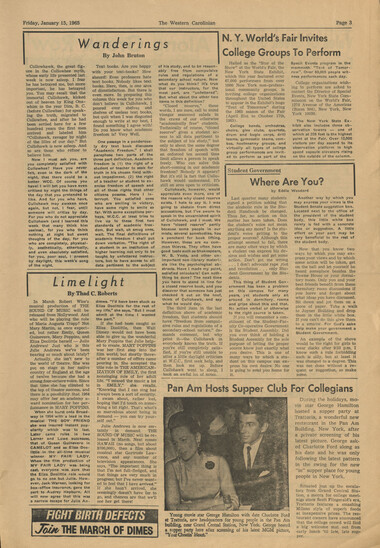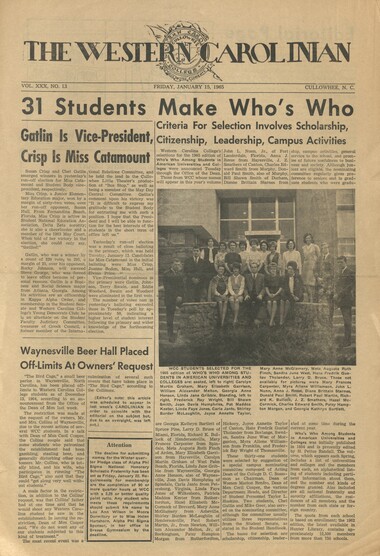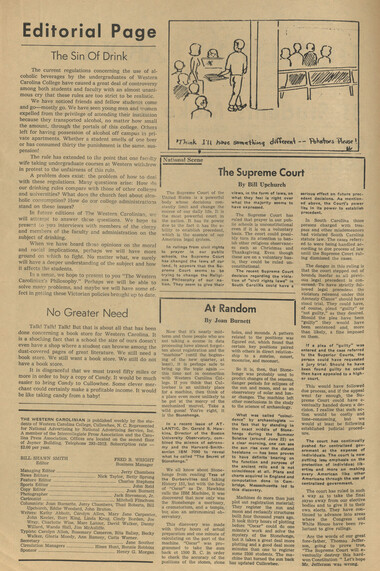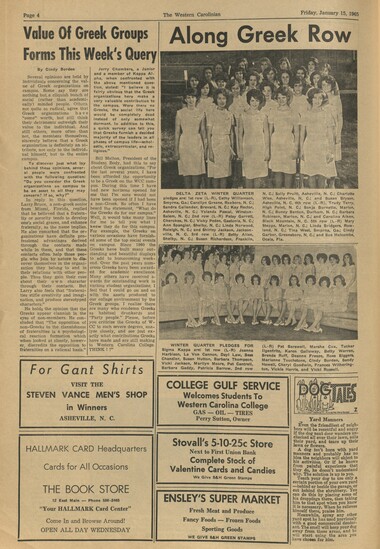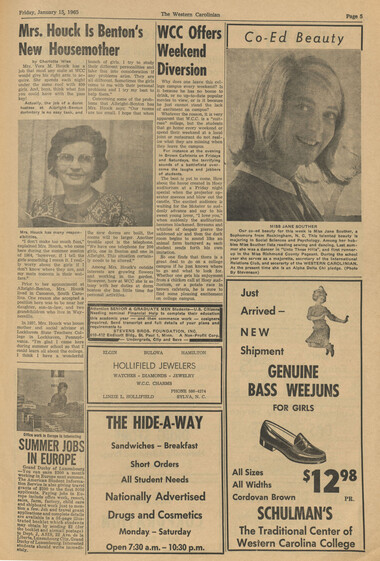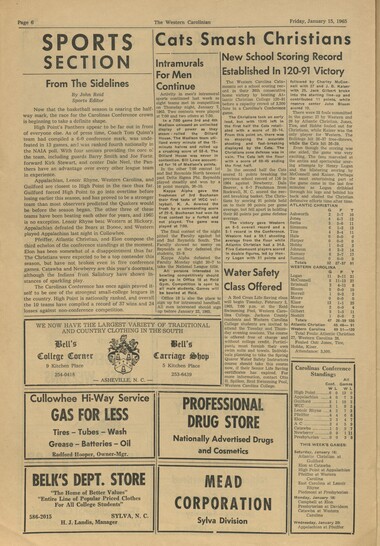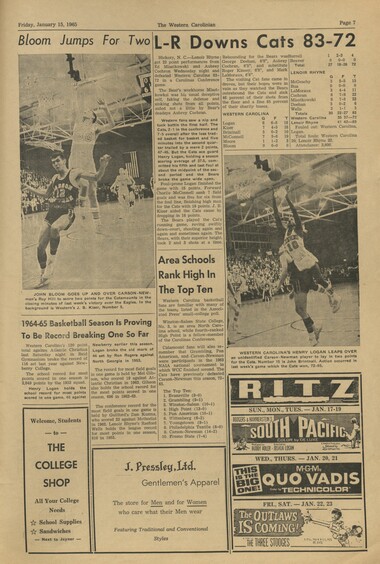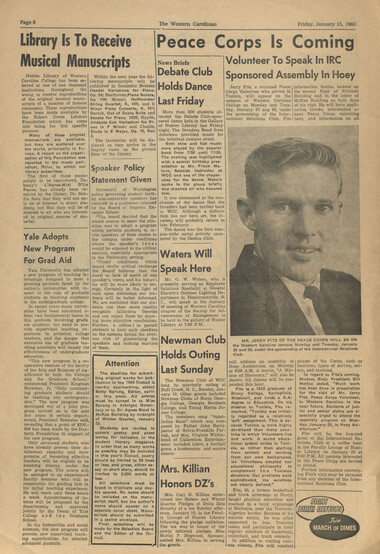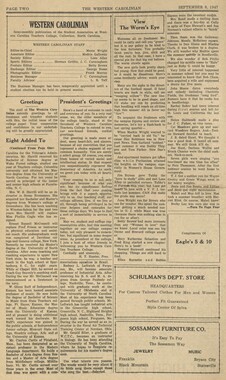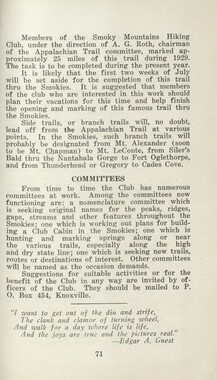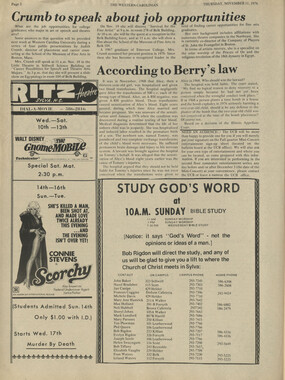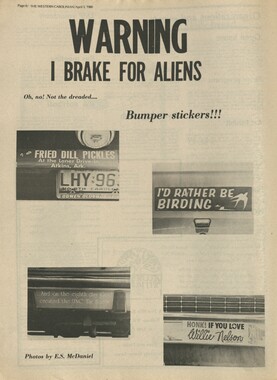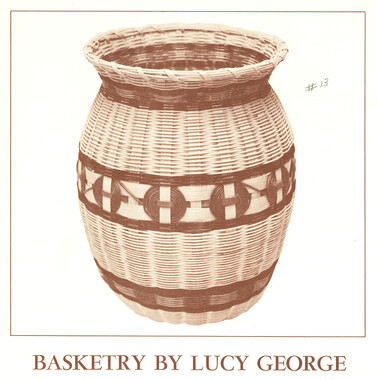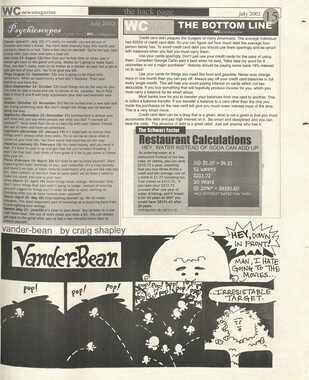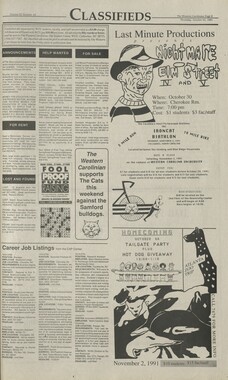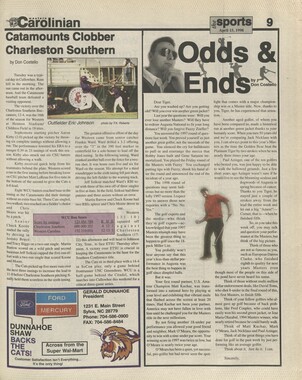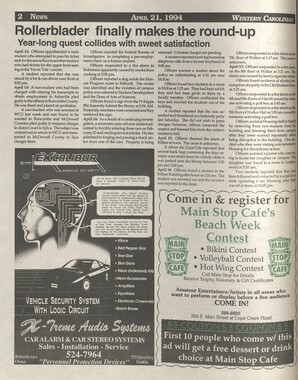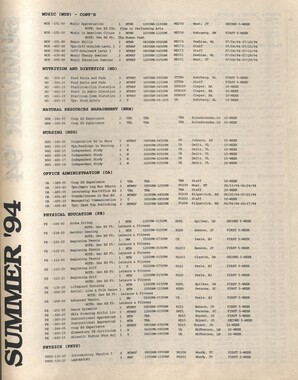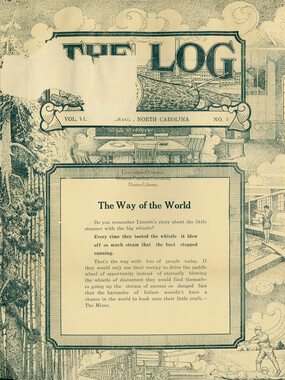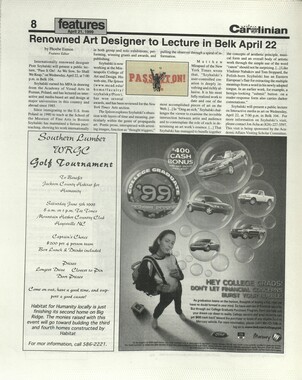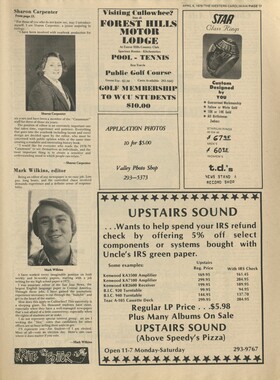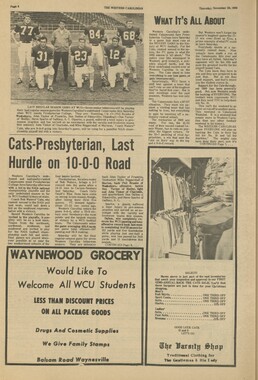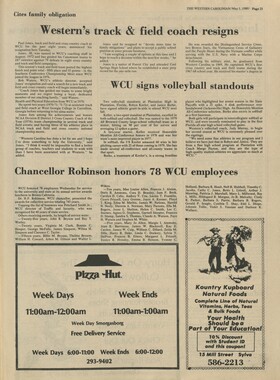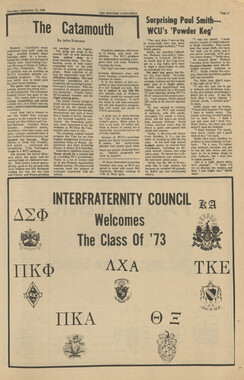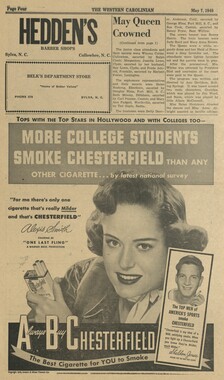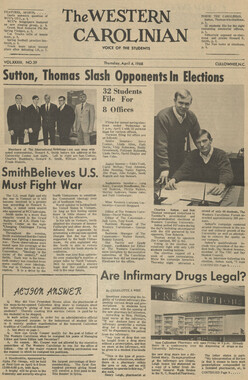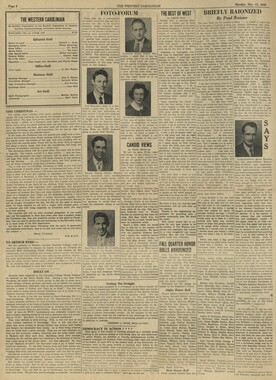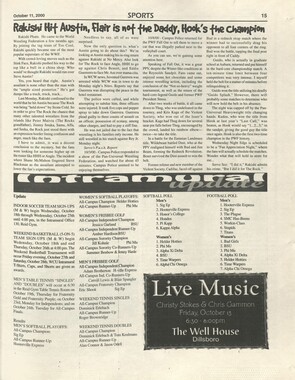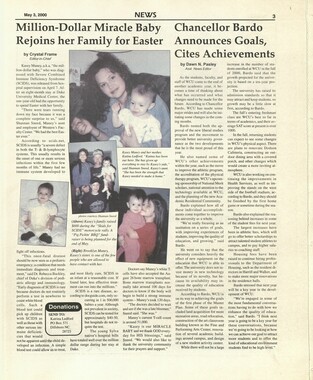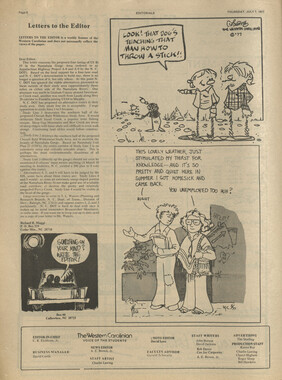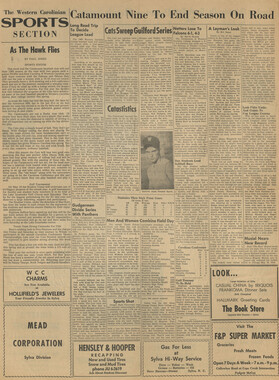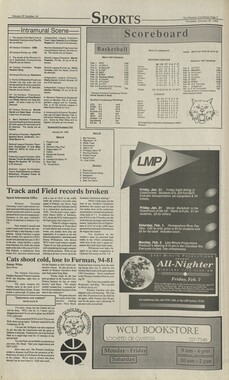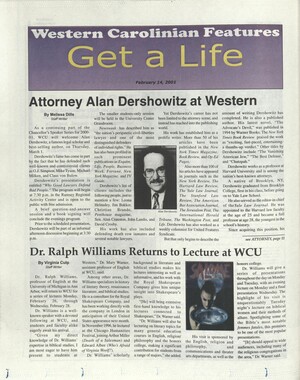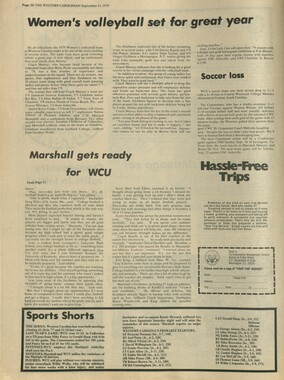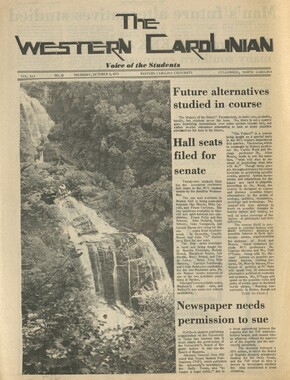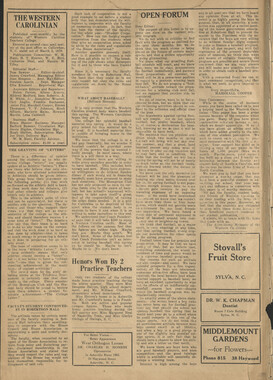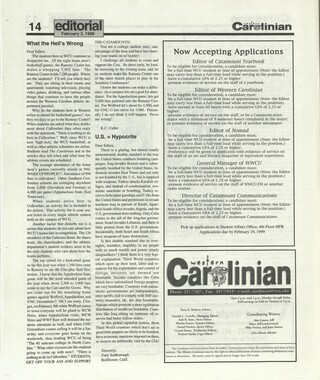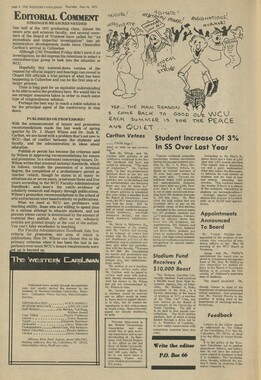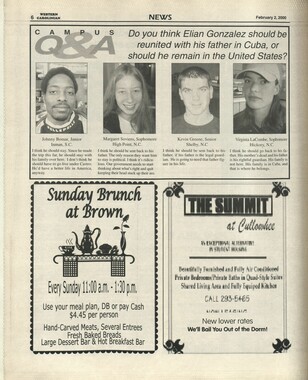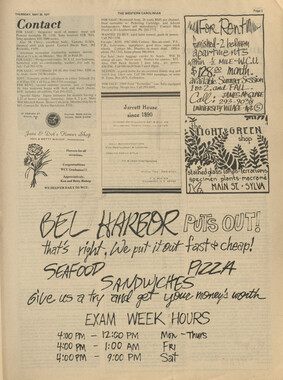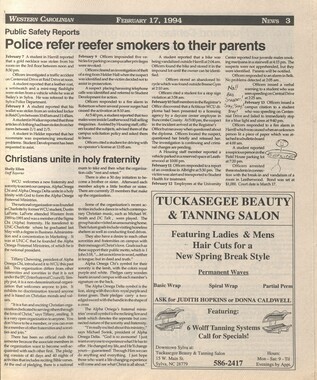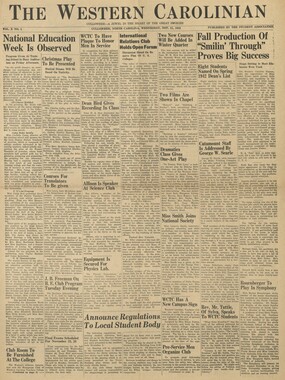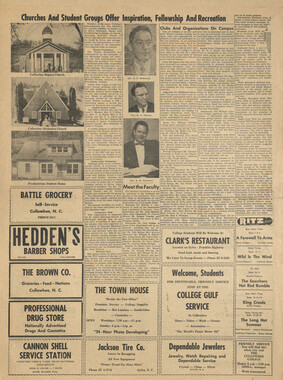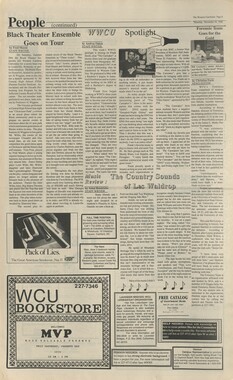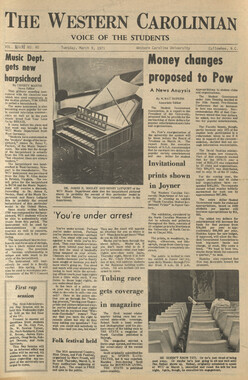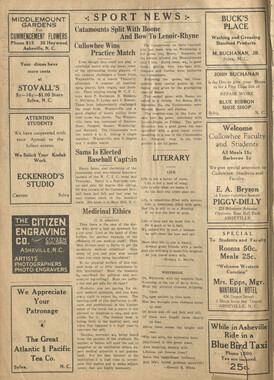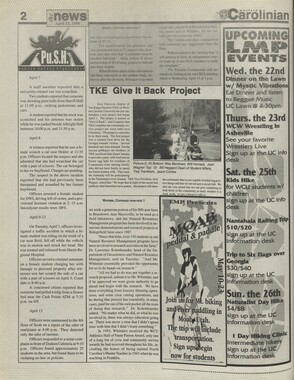Western Carolina University (20)
View all
- Canton Champion Fibre Company (2308)
- Cherokee Traditions (291)
- Civil War in Southern Appalachia (165)
- Craft Revival (1942)
- Great Smoky Mountains - A Park for America (2766)
- Highlights from Western Carolina University (430)
- Horace Kephart (941)
- Journeys Through Jackson (154)
- LGBTQIA+ Archive of Jackson County (85)
- Oral Histories of Western North Carolina (314)
- Picturing Appalachia (6772)
- Stories of Mountain Folk (413)
- Travel Western North Carolina (160)
- Western Carolina University Fine Art Museum Vitreograph Collection (129)
- Western Carolina University Herbarium (92)
- Western Carolina University: Making Memories (708)
- Western Carolina University Publications (2283)
- Western Carolina University Restricted Electronic Theses and Dissertations (146)
- Western North Carolina Regional Maps (71)
- World War II in Southern Appalachia (131)
University of North Carolina Asheville (6)
View all
- Western Carolina College (199)
- Western Carolina Teachers College (239)
- Western Carolina University (1792)
- Allanstand Cottage Industries (0)
- Appalachian National Park Association (0)
- Bennett, Kelly, 1890-1974 (0)
- Berry, Walter (0)
- Brasstown Carvers (0)
- Cain, Doreyl Ammons (0)
- Carver, George Washington, 1864?-1943 (0)
- Cathey, Joseph, 1803-1874 (0)
- Champion Fibre Company (0)
- Champion Paper and Fibre Company (0)
- Cherokee Indian Fair Association (0)
- Cherokee Language Program (0)
- Crittenden, Lorraine (0)
- Crowe, Amanda (0)
- Edmonston, Thomas Benton, 1842-1907 (0)
- Ensley, A. L. (Abraham Lincoln), 1865-1948 (0)
- Fromer, Irving Rhodes, 1913-1994 (0)
- George Butz (BFS 1907) (0)
- Goodrich, Frances Louisa (0)
- Grant, George Alexander, 1891-1964 (0)
- Heard, Marian Gladys (0)
- Kephart, Calvin, 1883-1969 (0)
- Kephart, Horace, 1862-1931 (0)
- Kephart, Laura, 1862-1954 (0)
- Laney, Gideon Thomas, 1889-1976 (0)
- Masa, George, 1881-1933 (0)
- McElhinney, William Julian, 1896-1953 (0)
- Niggli, Josephina, 1910-1983 (0)
- North Carolina Park Commission (0)
- Osborne, Kezia Stradley (0)
- Owens, Samuel Robert, 1918-1995 (0)
- Penland Weavers and Potters (0)
- Rhodes, Judy (0)
- Roberts, Vivienne (0)
- Roth, Albert, 1890-1974 (0)
- Schenck, Carl Alwin, 1868-1955 (0)
- Sherrill's Photography Studio (0)
- Smith, Edward Clark (0)
- Southern Highland Handicraft Guild (0)
- Southern Highlanders, Inc. (0)
- Stalcup, Jesse Bryson (0)
- Stearns, I. K. (0)
- Thompson, James Edward, 1880-1976 (0)
- United States. Indian Arts and Crafts Board (0)
- USFS (0)
- Vance, Zebulon Baird, 1830-1894 (0)
- Weaver, Zebulon, 1872-1948 (0)
- Western Carolina University. Mountain Heritage Center (0)
- Whitman, Walt, 1819-1892 (0)
- Wilburn, Hiram Coleman, 1880-1967 (0)
- Williams, Isadora (0)
- 1920s (57)
- 1930s (69)
- 1940s (114)
- 1950s (66)
- 1960s (314)
- 1970s (599)
- 1980s (406)
- 1990s (379)
- 2000s (195)
- 2010s (83)
- 1600s (0)
- 1700s (0)
- 1800s (0)
- 1810s (0)
- 1820s (0)
- 1830s (0)
- 1840s (0)
- 1850s (0)
- 1860s (0)
- 1870s (0)
- 1880s (0)
- 1890s (0)
- 1900s (0)
- 1910s (0)
- 2020s (0)
- Jackson County (N.C.) (2282)
- Appalachian Region, Southern (0)
- Asheville (N.C.) (0)
- Avery County (N.C.) (0)
- Blount County (Tenn.) (0)
- Buncombe County (N.C.) (0)
- Cherokee County (N.C.) (0)
- Clay County (N.C.) (0)
- Graham County (N.C.) (0)
- Great Smoky Mountains National Park (N.C. and Tenn.) (0)
- Haywood County (N.C.) (0)
- Henderson County (N.C.) (0)
- Knox County (Tenn.) (0)
- Knoxville (Tenn.) (0)
- Lake Santeetlah (N.C.) (0)
- Macon County (N.C.) (0)
- Madison County (N.C.) (0)
- McDowell County (N.C.) (0)
- Mitchell County (N.C.) (0)
- Polk County (N.C.) (0)
- Qualla Boundary (0)
- Rutherford County (N.C.) (0)
- Swain County (N.C.) (0)
- Transylvania County (N.C.) (0)
- Watauga County (N.C.) (0)
- Waynesville (N.C.) (0)
- Yancey County (N.C.) (0)
- Newsletters (510)
- Publications (documents) (1773)
- Aerial Photographs (0)
- Aerial Views (0)
- Albums (books) (0)
- Articles (0)
- Artifacts (object Genre) (0)
- Bibliographies (0)
- Biography (general Genre) (0)
- Cards (information Artifacts) (0)
- Clippings (information Artifacts) (0)
- Crafts (art Genres) (0)
- Depictions (visual Works) (0)
- Design Drawings (0)
- Drawings (visual Works) (0)
- Envelopes (0)
- Facsimiles (reproductions) (0)
- Fiction (general Genre) (0)
- Financial Records (0)
- Fliers (printed Matter) (0)
- Glass Plate Negatives (0)
- Guidebooks (0)
- Internegatives (0)
- Interviews (0)
- Land Surveys (0)
- Letters (correspondence) (0)
- Manuscripts (documents) (0)
- Maps (documents) (0)
- Memorandums (0)
- Minutes (administrative Records) (0)
- Negatives (photographs) (0)
- Newspapers (0)
- Occupation Currency (0)
- Paintings (visual Works) (0)
- Pen And Ink Drawings (0)
- Periodicals (0)
- Personal Narratives (0)
- Photographs (0)
- Plans (maps) (0)
- Poetry (0)
- Portraits (0)
- Postcards (0)
- Programs (documents) (0)
- Questionnaires (0)
- Scrapbooks (0)
- Sheet Music (0)
- Slides (photographs) (0)
- Songs (musical Compositions) (0)
- Sound Recordings (0)
- Specimens (0)
- Speeches (documents) (0)
- Text Messages (0)
- Tintypes (photographs) (0)
- Transcripts (0)
- Video Recordings (physical Artifacts) (0)
- Vitreographs (0)
- The Reporter, Western Carolina University (510)
- WCU Students Newspapers Collection (1744)
- A.L. Ensley Collection (0)
- Appalachian Industrial School Records (0)
- Appalachian National Park Association Records (0)
- Axley-Meroney Collection (0)
- Bayard Wootten Photograph Collection (0)
- Bethel Rural Community Organization Collection (0)
- Blumer Collection (0)
- C.W. Slagle Collection (0)
- Canton Area Historical Museum (0)
- Carlos C. Campbell Collection (0)
- Cataloochee History Project (0)
- Cherokee Studies Collection (0)
- Daisy Dame Photograph Album (0)
- Daniel Boone VI Collection (0)
- Doris Ulmann Photograph Collection (0)
- Elizabeth H. Lasley Collection (0)
- Elizabeth Woolworth Szold Fleharty Collection (0)
- Frank Fry Collection (0)
- George Masa Collection (0)
- Gideon Laney Collection (0)
- Hazel Scarborough Collection (0)
- Hiram C. Wilburn Papers (0)
- Historic Photographs Collection (0)
- Horace Kephart Collection (0)
- Humbard Collection (0)
- Hunter and Weaver Families Collection (0)
- I. D. Blumenthal Collection (0)
- Isadora Williams Collection (0)
- Jesse Bryson Stalcup Collection (0)
- Jim Thompson Collection (0)
- John B. Battle Collection (0)
- John C. Campbell Folk School Records (0)
- John Parris Collection (0)
- Judaculla Rock project (0)
- Kelly Bennett Collection (0)
- Love Family Papers (0)
- Major Wiley Parris Civil War Letters (0)
- Map Collection (0)
- McFee-Misemer Civil War Letters (0)
- Mountain Heritage Center Collection (0)
- Norburn - Robertson - Thomson Families Collection (0)
- Pauline Hood Collection (0)
- Pre-Guild Collection (0)
- Qualla Arts and Crafts Mutual Collection (0)
- R.A. Romanes Collection (0)
- Rosser H. Taylor Collection (0)
- Samuel Robert Owens Collection (0)
- Sara Madison Collection (0)
- Sherrill Studio Photo Collection (0)
- Smoky Mountains Hiking Club Collection (0)
- Stories of Mountain Folk - Radio Programs (0)
- Venoy and Elizabeth Reed Collection (0)
- WCU Gender and Sexuality Oral History Project (0)
- WCU Mountain Heritage Center Oral Histories (0)
- WCU Oral History Collection - Mountain People, Mountain Lives (0)
- Western North Carolina Tomorrow Black Oral History Project (0)
- William Williams Stringfield Collection (0)
- Zebulon Weaver Collection (0)
- College student newspapers and periodicals (1769)
- African Americans (0)
- Appalachian Trail (0)
- Artisans (0)
- Cherokee art (0)
- Cherokee artists -- North Carolina (0)
- Cherokee language (0)
- Cherokee pottery (0)
- Cherokee women (0)
- Church buildings (0)
- Civilian Conservation Corps (U.S.) (0)
- Dams (0)
- Dance (0)
- Education (0)
- Floods (0)
- Folk music (0)
- Forced removal, 1813-1903 (0)
- Forest conservation (0)
- Forests and forestry (0)
- Gender nonconformity (0)
- Great Smoky Mountains National Park (N.C. and Tenn.) (0)
- Hunting (0)
- Landscape photography (0)
- Logging (0)
- Maps (0)
- Mines and mineral resources (0)
- North Carolina -- Maps (0)
- Paper industry (0)
- Postcards (0)
- Pottery (0)
- Railroad trains (0)
- Rural electrification -- North Carolina, Western (0)
- School integration -- Southern States (0)
- Segregation -- North Carolina, Western (0)
- Slavery (0)
- Sports (0)
- Storytelling (0)
- Waterfalls -- Great Smoky Mountains (N.C. and Tenn.) (0)
- Weaving -- Appalachian Region, Southern (0)
- Wood-carving -- Appalachian Region, Southern (0)
- World War, 1939-1945 (0)
- Text (2283)
- MovingImage (0)
- Sound (0)
- StillImage (0)
Western Carolinian Volume 30 Number 13
Item
Item’s are ‘child’ level descriptions to ‘parent’ objects, (e.g. one page of a whole book).
-
-
Friday, January 15, 1965 The Western Carolinian Page 3 Wanderings By John Bruton Cullowhawk, the great figure in the Cullowhee myth, whose early life presented last week is now asleep. I fear he has betrayed me, but more important, he has betrayed you. You may recall that the immortal Cullohawk, kicked out of heaven by King Onawhim in the year Dim, B. C. (before Cullowhee) for speaking the truth, migrated to Cullowhee, and after he had been settled here for a few hundred years the first men arrived and labeled him "Cullohawk, ravager by night of the lilies of our day." But Cullohawk is now asleep. And so are those who refuse to believe him. Now I must ask you, are you completely satisfied with Cullowhee? Have you never felt, even in the dark of the night, that there could be a better WCC. Of course you have! I will bet you have even critized by night the things of the day that you pretended to like. And for you who have, Cullohawk may awaken once again, but not, I fear, until someone will critize by day. For you who do not appreciate Cullohawk (and I learned this week that many think him useless), for you who think nothing at night but sweet thoughts of the day, for you who are completely, physically, aesthetically, etherlcally, and even absolutely satisfied, for you, poor soul, I present by daylight, this week's song of the night. Text books. Are you happy with your text-books? How absurd! Even professors hate text books. Nobody likes text books. Here, then, is one area of dissatisfaction. But there is even more. In preparing this column this week for you who don't believe in Cullohawk, I poured over shelves and shelves of useless text books, but quit when I was disgusted enough to write at my best, I found something I agree with! Do you know what academic freedom is? Very Well. One passage in a ponderously dry text book discusses "Academic Freedom." I shall paraphase two parts of the three part definition. Academic freedom is (1) the right of a student or teacher to seek for truth in his chosen field without impediment. (2) the right of a teacher or student to exercise freedom of speech and all of those rights that other citizens possess. Here I Interrupt. You satisfied ones who are smiling in victory, have some right to smile so far. With some exceptions perhaps, W.C.C. at least tries to live up to these first two standards of academic freedom. But wait, oh smug ones, wait. The final definitions of academic freedom I shall put down verbatim. "The right of a student in an institution of higher learning not only to be taught by unfettered instructors, but to have access to all data pertinent to the subject N. Y. World's Fair Invites College Groups To Perform Limelight By Thad C. Roberts In March Robert Wise's musical production of THE SOUND OF MUSIC will be released from Hollywood. And who will be playing the role of Maria Augusta Trapp? Not Mary Martin, as once expected, but rather Emily, Queen Guinevere, Mary Poppins, and Eliza Doolittle herself — Julie Andrews! Just who is this Julie Andrews we've been hearing so much about lately? Actually, she isn't new to the world of theatre. She was put on stage in her native country of England at the age of twelve because she had a strong four-octave voice. Since that time she has climbed to the top of theatre success, and there is a possibility that 1964 may offer her an academy a- ward nomination for her performance in MARY POPPINS. When she burst onto Broadway in 1954 with a lead in the musical THE BOY FRIEND she was insured instant popularity which was to last. Later came roles in two Lerner and Lowe successes, that of Queen Guinevere in CAMELOT and as Eliza Doolittle in the all-time musical winner MY FAIR LADY. When the film production of MY FAIR LADY was being cast, everyone was sure that the Eliza Doolittle role would go to no one but Julie. However, Jack Warner, looking for box-office insurance, gave the part to Audrey Hepburn. All will now agree that this was a narrow escape for Julie An drews. "I'd have been stuck as Eliza Doolittle for the rest of my life," she says, "But I must admit at the time I wanted the part." If she had been caught as Eliza Doolittle, then Walt Disney would not have been able to give us the wonderful Mary Poppins that Julie helped to create. MARY POPPINS was her first step into the film world, but shortly thereafter a number of offers came pouring in. She accepted the title role in THE AMERICANIZATION OF EMILY, the first nonsinging role of her adult life. "I missed the music a lot in EMILY," she recalls. "Knowing that I can sing has always been a sort of security. I swam about, rather lost, hoping that I'd touch on something a bit right. That's what's so marvelous about being in demand — you can try yourself out." Julie Andrews is now certainly in demand. THE SOUND OF MUSIC will be released in March. Next comes HAWAII (no songs, but about $700,000), then a film about musical star Gertrude Lawrence, and any number of television appearances. She says, "The important thing is that I'm not full-fledged, and that things are very much in progress; but I've never wanted to feel that I have arrived." If she hasn't arrived, she seemingly doesn't have far to go, and chances are that we'll see her get there! of his study, and to be reasonably free from compulsive rules and regulations of a secondary school nature. Now what do you think? It's true that our instructors, for the most part, are "unfettered". But what about the other two items in this definition? "Closed reserve," these words, I am sure, call to mind vinegar seasoned salads in the craws of our otherwise "academically free" students. Technically of course, "closed reserve" gives a student access to all data pertinent to the subject of his study," but only to about the same degree that freedom of speech with an enforced ten second time limit allows a person to speak freely. Who can solve this short-coming in our academic freedom? Nobody it appears? But it's stil la fact that Cullohawk would understand. It's still an area open to criticism. Cullohawk, however, would appreciate even more, one of the reasons why closed reserve exists. I hate to say it. I was going to abstain from direct accusations, but I've sworn to speak in the unvarnished spirit of Cullohawk, and I must. We have "closed reserve" partly because some people in our mists, several somebodies, has a penchant for book lifting. However, these are no common thieves. They often have good taste such as Shakespeare, W. B. Yeats, and other unimportant non-library materials like the psychological abstracts. Have I made my point, satisfied onlookers? Can noth- thing be done? The next time you have to stand in line for a closed reserve book, and you discover that someone has just checked it out on the hoof, think of Cullohawk, and say what he would day. The third item in the last definition above of academic freedom, that students should have "freedom from compulsive rules and regulations of a secondary-school nature," demands comment, but why print it—the Cullohawk in everybody knows the truth. If you're still completely satisfied, if you're still unable to utter a little daylight criticism at W.C.C, first seek help, and then look me up. Before Cullohawk went to sleep, I took an awful lot of notes. Hailed as the "Star of the Show" at the World's Fair, the New York State Exhibit, which this year featured over 67,000 performers from over 1800 New York non-professional community groups, is inviting college organizations throughout the United States to appear in the Exhibit's huge "Tent of Tomorrow" during the 1965 season of the Fair (April 21st to Otcober 17th, 1965). College bands, orchestras, choirs, glee clubs, quartets, drum and bugle corps, drill teams, gymnastic teams, combos, hootenanny groups, and virtually all types of college group performances are invited to perform as part of the Specil Events program In the mammoth "Tent of Tomorrow". Over 60,000 people witness performances each day. College organizations wishing to perform are asked to contact the Director of Special Events, New York State Commission on the World's Fair, 1270 Avenue of the Americas (Room 304), New York, New York 10020. The New York State Exhibit also includes three observation towers — one of which at 226 feet is the highest point at the Fair. Over 12,000 visitors per day ascend to Its observation platform in high speed capsule elevators rising on the outside of the column. Student Government Where Are You? by Eddie Woodard Last quarter many students signed a petition asking that the alcoholic rule in the Student Handbook be changed. Thus far, no action on this matter has been taken. Does the student's voice not mean anything any more? Is the student's voice getting to the proper sources? Although this attempt seemed to fail, there are many other ways by which a student can express his desires and wishes and get some action. Don't get me wrong ... I don't advocate rape ,riot and revolution . . . only Student Government by the Students. This thing of Student Government has been a problem on this campus for many years, yet students only sit around in dormitory., rooms and gripe about this and that. No action verbal or otherwise to the right source is taken. If you will remember a constituent of the Student-Faculty Co-operative Government is the Student Assembly. Did you ever think of holding a Student Assembly for the sole purpose of letting the proper source know just exactly what you desire. This is one of many ways by which a student on this campus can express his own desire. No one is going to send you home for it. Another way by which you may express your views is the Student Senate suggestion box. Located next to the office of the president of the student body, this little white box rarely is fed with a concrete idea or suggestion. A little effort on your part may be very beneficial to the rest of the student body. Now that you know two ways by which you may express your views and by which some action will be taken, get on the ball and let yourself be heard someplace besides the Towne House or your dormitory room. Only you and your best friends benefit from these dormitory room discussions if you leave and forget about what ideas you have discussed. Sit down and jot them on a piece of paper. Take a walk to Joyner Building and drop them in the little white box. If you can't do this give them to a senator. For God's sake help make your government a Student Government. An example of the above would be the right for girls to wear slacks after 9:30 p.m. I know such a rule forbidding such is silly, but at least it was changed to a degree. This was not done without a request or suggestion, so make some. FIGHT BIRTH DEFECTS Jm* THE MARSH OF DIMES Pan Am Hosts Supper Club For Collegians During the holidays, movie star George Hamilton hosted a supper party at Trattoria, a wonderful new restaurant in the Pan Am Building, New York, after a private screening of his latest picture. George asked Charlotte Ford along as his date and he was only following the latest pattern in the swing for the new "in" supper place for young people in New York. Situated just up the escalators from Grand Central Station, a mecca for college meet- nigs since Scott Fitzgerald's era, Trattoria features a smashing Milano style of superb foods at inexpensive prices. The restaurant owners have announced that the college crowd will find a big welcome mat out from early lunch 'til late, late supper. Young movie star George Hamilton with date Charlotte Ford at Trattoria, new headquarters for young people in the Pan Am building, near Grand Central Station, New York. George hosted t supper party here after screening of his latest MGM picture, "YomCheatirf Heart"
Object
Object’s are ‘parent’ level descriptions to ‘children’ items, (e.g. a book with pages).
-
The Western Carolinian is Western Carolina University’s student-run newspaper. The paper was published as the Cullowhee Yodel from 1924 to 1931 before changing its name to The Western Carolinian in 1933.
-
